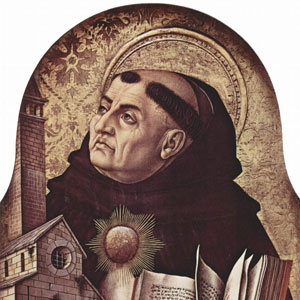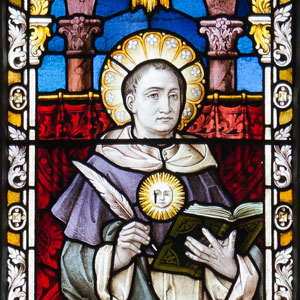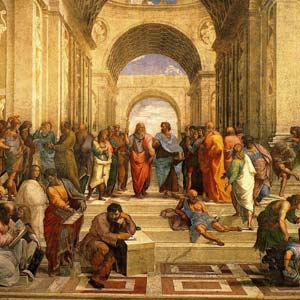
C. S. Peirce and the Implications of Pragmatism
An examination of the basic assumptions of pragmatism, the influential school of epistemology founded by Charles Sanders Peirce. Read Article

An examination of the basic assumptions of pragmatism, the influential school of epistemology founded by Charles Sanders Peirce. Read Article

Among the species of law, Aquinas numbers the “eternal law” as foundational for the natural law. What is meant by this type of “law”, and what are its implications for the relation between morality and revelation / theology? This article assays some basic themes pertaining to this question. Read Article

A general overview of Wittgenstein's epistemology, how it denies objective meaning outside of language games, and the consequences thereof: relativism in postmodern philosophy. Read Article

The law is something “promulgated”—or so Aquinas states in his common definition of law. This seems quite acceptable in the case of human, positive law. However, how can one speak of a “promulgation” of the natural law, let alone the eternal law? This article is a discussion of the general themes involved in considering this problem. Read Article

For theology to be necessary to a city and the formation of its laws, then that necessity must arise out of the fact that theology says something true about the world, and that it is the aim of law to harmonize the city towards the truth of that reality. Read Article

The term “law” is most easily understood in terms of the positive law that we experience in our day-to-day life. In order to discuss “natural law” without being equivocal in our use of language, we need to consider how it can even be possible to transition from discussing the case of positive “law” to that of natural “law.” Read Article
A consideration of Thomas Aquinas’ general definition of law. These reflections will serve as the basis for probing the implication of this definition, ultimately aiming to treat the natural law in its proper boundaries. Read Article
Many well-meaning philosophical ethicists appeal to some notion of “natural law”, as though this notion accounts for the fundamental aspects of moral philosophy. However, the domain of discourse for “law” is an explicitly inscribed one. In this article, we will note Aquinas’ placement of the “conceptual space” for discussions of “law and the natural law.” Read Article

Although the term “idealism” is used in many senses to describe various trends in epistemology, each case is most illuminatingly understood in its historical context. To understand Berkeley's idealism, we must understand it as a reaction to Locke. Read Article

Kierkegaard explains that given the ontological reality of Christianity, sin at its base is the denial of who we really are and our relationship to reality. Read Article

The way we know the world determines to a large extent our ability to understand what a thing is, such as a tree or an animal. This in turn forms our understanding of the intelligibility in the world itself Read Article

In his Leviathan, Thomas Hobbes outlines the character of speech, and words which are the components of speech. His assumption that words only nominally represent particulars affects how he understands propositional logic. Read Article

In his Leviathan, Thomas Hobbes rejects the Ultimate End and the Ultimate Good in favor of the natural end and the natural good of man. Man, because of his desires, must always aim to acquire power in order to maintain his estate. Read Article

The division of the sciences, especially of the liberal arts from the other sciences, is propaedeutic for knowing and understanding the world around us. Read Article

Moore gives three definitions of the Good through which he hopes to restart the science of Ethics. The Good, however, is not so easily defined. First Moore must differentiate between the Good in a moral sense and the Good in the ontological sense. Read Article

During the Middle Ages, the rediscovery of Aristotelianism brought about the question of what the relationship between each science was. Is there a natural hierarchy? Can any science be understood independently of the other sciences? Read Article

A reflection on Martin Heidegger's essay The Question Concerning Technology and on the dangers he warned of that are present in contemporary society. Read Article

A comparison is made between the Thomistic and the Neo-Platonic notion of signs, and how such signs relate to our knowledge of the world. Read Article

Hume attempts to deconstruct epistemology through a criticism of the necessity of cause and effect. Instead, he spurs the investigation of nature through statistics and probability. Read Article

A discussion of Porphyry's Isagoge and Aristotle's Categories. Porphyry discusses the priority among the predicables. Is this priority logical or ontological? Read Article

Is gender equality possible in the Ideal City in Plato's Republic? Also, is gender equality best for the city? Is it best for the individual? Read Article

Comments on the fideist objections to a Christian philosophy, that revelation is a sufficient source of truth apart from philosophy. Read Article

In the Republic, Socrates gives an argument for the inclusion of women in the training of warriors for the Ideal City. Read Article
Thomas Aquinas examines pure forms in an attempt to distinguish the metaphysical principles of beings. He extrapolates that being and essence are distinct. Read Article

In the Timaeus, Plato addresses the principle on which our world was established, and its relationship to the Forms and to Beauty. Read Article

A reflection on the opening chapters of “The Spirit of Mediaeval Philosophy” by Etienne Gilson, in which Gilson examines the possibility of a Christian Philosophy. Read Article

During his examination of geometrical figures, Descartes develops a new means of abstracting which goes beyond what others before him have done. Read Article

The Minos deals with law and its source, and how they are related. The dialog acts, therefore, as a prequel to Plato's Laws, which explores good law. Read Article

Kant gives a revised definition of truth that contains his own vocabulary and explores the possibility of general criterion of truth. Read Article

Martin Heidegger attempts to formulate a metaphysics within his existentialist system, using as his basis the relationship between time and being. Read Article

John Duns Scotus examines the two means of dividing being, into finite and infinite and into the ten genera, to discover what a transcendental is. Read Article

In Plato’s Laws an argument is made for the pedagogical need for symposia, the drinking parties in Greece. In the Symposium, we see how one plays out. Read Article

A reflection on Plotinus' treatment of the union of Intellect and the intelligibles and a comparison of his treatment with the epistemological. Read Article

Aristotle explains in his Physics that good philosophy begins with the observation of physical objects, and ends with relating those objects to thought. Read Article

A brief reflection on Socrates’ statement in Plato's Apology that the unexamined life is not worth living. Read Article